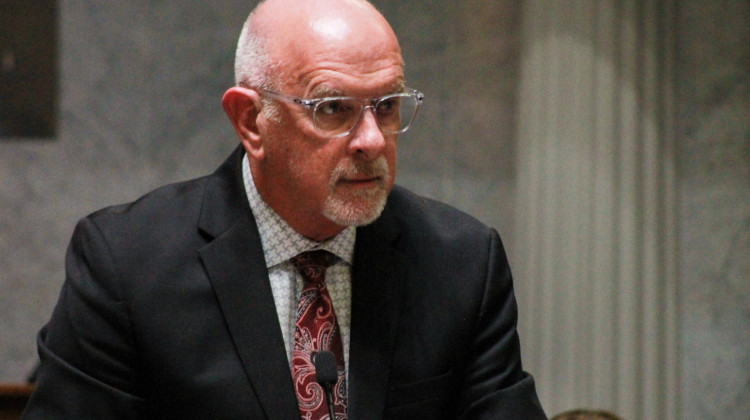
Kerwin Olson of the Citizens Action Coalition speaks in opposition to a bill that lets utilities more quickly recover the cost of certain projects from their customers at a Indiana Senate Utilities Committee hearing in 2019.
Rebecca Thiele/IPB NewsLegislative committees are important. They’re the first time bills are heard and often the only times the public can speak for or against a bill in front of lawmakers that don’t represent them. It’s also where most bills die.
What do legislative committees do?
It would be impossible for the House and Senate to hear all of the roughly 800 to 1,200 bills introduced in an Indiana legislative session. So the leaders of those chambers assign bills to one of the more than 40 standing committees to give them a first look. These committees can cover topics like health or transportation.
In the 2023 session, 67 percent of Senate bills introduced died in committee and more than 40 percent never even got a hearing. That shows just how powerful these committees are.
How do committees form?
The House speaker and the Senate president pro tempore decide which lawmakers serve on what committees and how many members should be on each committee. Ed Feigenbaum is the editor of the newsletter Indiana Legislative Insight.
He said sometimes the speaker and Senate president will bring in a small group of lawmakers to help them make these decisions. The minority party — in this case Democratic lawmakers — can also appoint their own members to committees.
Committees heavily influence what happens to bills
In 2021, the chair of the House Environmental Affairs Committee refused to hear any bills he was assigned from the House — effectively killing 13 bills. Andrew Downs is director emeritus of the Mike Downs Center for Indiana Politics at Purdue University Fort Wayne. He said committee chairs act as gatekeepers for many bills.
“Indiana gives the chairs of its committees quite a bit of leeway, and so it's good to be chair," Downs said.
Committee chairs can often make committees what they are. Downs said they can be a litmus test of what might happen on a chamber floor. They also get to decide how many bills a committee hears and what kinds of bills they’re going to prioritize.
In February 2023, it seemed youth climate activists’ moment had come. Their bill to create a climate solutions task force was finally given a hearing in the Senate Environmental Affairs Committee.
But the chair adjourned the committee without voting on the bill. He said it needed more work and likely would have died had it been brought for a vote. Downs said this isn't unusual — it often takes several years and many edits before a bill passes. Even a hearing without a vote is valuable.
“Hey, you've still moved through the process. You've brought the issue up, you've had a discussion about it, you've raised awareness about it. You've maybe even found out other positions on the issue that you hadn't thought about," he said.
What do lawmakers get out of serving on committees?
A lawmaker might want to serve on a certain committee for any number of reasons — maybe they work in a certain industry or issues brought up in that committee are particularly relevant to their district.
Feigenbaum said lawmakers that serve on the same committee for years can become experts in those areas.
"It can also help you raise campaign cash. You know, a lot of people don't want to talk about that. But, you know, certain industries are obviously very vested in certain committees and want to make sure that they have access to members," he said.
Of course, getting an appointment to the committee you want isn't always easy. Feigenbaum said the House speaker or the Senate president pro tempore can reward or punish lawmakers with committee appointments.
"A member may want to be appointed to, say, the House Committee on Ways and Means or the Senate Committee on Appropriations, the two big fiscal committees," Feigenbaum said. "But the leaders may say, 'Well, you know, you haven't been loyal enough to the to the party or the caucus. You haven't done enough to show us that you will be a valued member of that committee. So we're just going to put you on — picking something out of the the air — the Interstate Compacts Committee or the the Veterans Affairs Committee. And you can work your way up."
The next legislative session starts in January.
Rebecca is our energy and environment reporter. Contact her at rthiele@iu.edu or follow her on Twitter at @beckythiele.
 DONATE
DONATE






 Support WFYI. We can't do it without you.
Support WFYI. We can't do it without you.